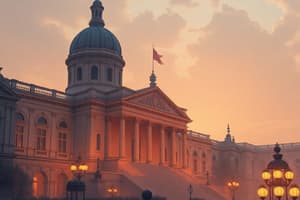Podcast
Questions and Answers
What is the primary role of bureaucracy in a democratic system?
What is the primary role of bureaucracy in a democratic system?
- To translate the intent of democratic institutions into action (correct)
- To perform audits on government spending
- To oversee the presidential election process
- To create new laws independently
Which of the following is NOT a component of the executive department?
Which of the following is NOT a component of the executive department?
- State Department
- Department of Defense
- Treasury Department
- NASA (correct)
What significant change did the Pendleton Act of 1883 introduce?
What significant change did the Pendleton Act of 1883 introduce?
- Created new cabinet departments
- Implemented a merit system for hiring in bureaucracy (correct)
- Transitioned to a spoil system for government appointments
- Established the independent operation of all agencies
What is one role of regulatory agencies like the US Securities and Exchange Commission?
What is one role of regulatory agencies like the US Securities and Exchange Commission?
What is a defining feature of the merit system in bureaucracy?
What is a defining feature of the merit system in bureaucracy?
Which of the following is an example of a government corporation?
Which of the following is an example of a government corporation?
Which aspect of bureaucracy is involved in rulemaking?
Which aspect of bureaucracy is involved in rulemaking?
What is the main purpose of having regulatory agencies operate separately from cabinet departments?
What is the main purpose of having regulatory agencies operate separately from cabinet departments?
What is meant by the term 'iron triangle' in the context of bureaucracy?
What is meant by the term 'iron triangle' in the context of bureaucracy?
Which type of bureaucratic oversight involves monitoring only after something has gone wrong?
Which type of bureaucratic oversight involves monitoring only after something has gone wrong?
What power does Congress possess that allows it to influence bureaucratic agencies?
What power does Congress possess that allows it to influence bureaucratic agencies?
What is a significant drawback of trying to run a government like a business?
What is a significant drawback of trying to run a government like a business?
Which role has the most control over the bureaucracy in terms of appointments and orders?
Which role has the most control over the bureaucracy in terms of appointments and orders?
What is a potential consequence of excessive unity within an iron triangle?
What is a potential consequence of excessive unity within an iron triangle?
What mechanism in bureaucratic oversight allows citizens to indirectly influence actions?
What mechanism in bureaucratic oversight allows citizens to indirectly influence actions?
What issue arises when the government operates similarly to a business?
What issue arises when the government operates similarly to a business?
Study Notes
Bureaucracy
- Definition: The system of public agencies that implement democratic decisions.
- Role: Carry out laws made by legislators.
- Examples: Cabinet departments, independent agencies, regulatory agencies, and government corporations.
Executive Department
- Cabinet Departments: High-level government agencies with specific responsibilities. Examples include State, Defense, Treasury, and Homeland Security.
- Independent Agencies: Operate separately from cabinet departments, often to reduce political influence and promote specific goals. Example: NASA.
- Regulatory Agencies and Commissions: Independent agencies that set and enforce regulations, often with the goal of creating consistency across administrations. Example: US Securities and Exchange Commission.
- Government Corporations: Government-run organizations that provide specific services, often not for profit. Example: Postal Service.
Who are the Bureaucrats?
- Merit System: Current system for hiring government employees based on qualifications and skills. Introduced by the Pendleton Act (1883).
- Spoil System: Previous system where government jobs were given based on political loyalty. This system was often seen as corrupt and inefficient.
Powers of Bureaucracy
- Rulemaking: Similar to the legislative process, agencies clarify laws and establish rules.
- Adjudication: Similar to a court process, agencies determine if a rule has been violated.
- Bureaucratic Lobbying: Can create "iron triangles" where an agency, legislative group, and interest group work together to promote a specific policy.
Monitoring Bureaucracy
- Overhead Democracy: Citizens have indirect control over bureaucracy through elections and political pressure.
- Police Patrol Oversight: Regular and continuous monitoring of bureaucracy.
- Fire Alarm Oversight: Monitoring that occurs only in response to a problem or crisis.
Influencing Bureaucracy
- President: Has the most control over bureaucracy through appointment power, executive orders, and the ability to delay funding.
- Congress: Can create and abolish agencies, set budgets, and use a legislative veto (though this power is contested).
- Judiciary: Reviews agency actions to ensure they are consistent with legislative intent and due process.
Reforming Bureaucracy
- Challenges: The government is not a business, and its priorities are not always aligned with efficiency and profit.
- Key Differences: Government aims to provide services and enforce laws, while businesses aim to make money.
Studying That Suits You
Use AI to generate personalized quizzes and flashcards to suit your learning preferences.
Description
Explore the structure and function of bureaucracy within government systems. This quiz covers the roles of various executive departments, independent agencies, regulatory agencies, and government corporations. Test your knowledge on how these entities implement democratic decisions and maintain public services.




